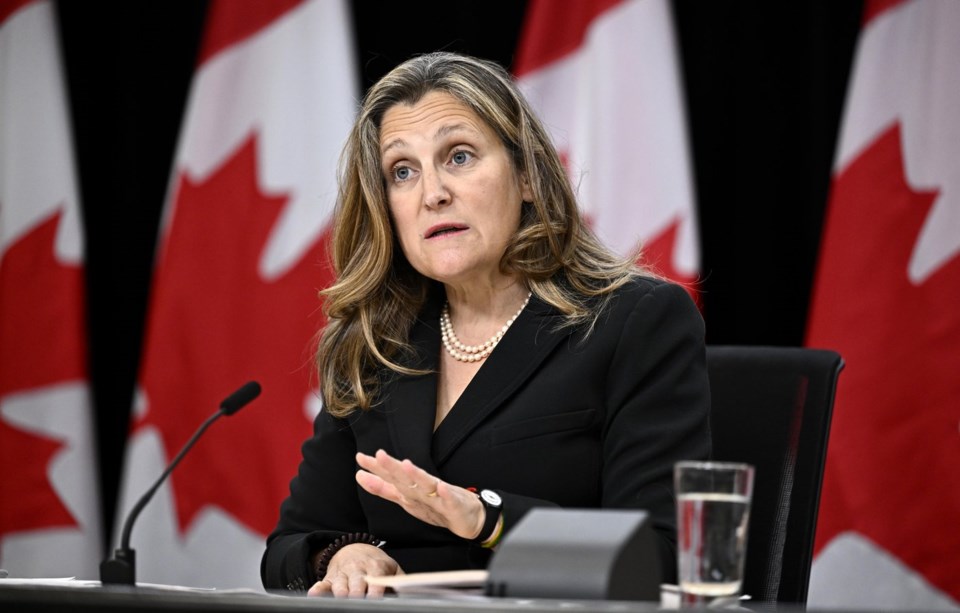TORONTO — Finance Minister Chrystia Freeland said Wednesday that the federal government is moving ahead with guidelines around sustainable investing and corporate climate disclosures, but details on the plans are scarce.
The move comes as a wide range of investors, asset managers and environmental groups have been pushing the government to roll out such guidelines, also known as green taxonomies, to attract more investment for emissions-reducing projects.
The federal government estimates achieving net-zero emissions in Canada by 2050 will require between $125 billion and $140 billion in annual investments, compared with current spending of between $15 billion and $25 billion.
"We know we need to pull in even more private capital. We need to crowd in even more private capital to have a transition happening at the pace and scale the climate requires," said Freeland at a Principles for Responsible Investment conference in Toronto.
Frustration has been mounting as efforts to create sustainable investment guidelines to attract more capital have been in the works for years in Canada, with multiple groups tasked with creating recommendations, but still nothing firm in place.
Those looking for answers will, however, have to wait a little longer, as the government says it plans to have a third-party organization develop the taxonomy, with the first guidelines issued within a year of the organization beginning its work. It did not provide a time estimate as to how quickly the unnamed organization would get started.
On the potential inclusion of fossil fuels — a key area of contention — the government says it doesn't anticipate new natural gas production would qualify, but that drafters could consider existing natural gas for its potential to displace more polluting fuels internationally.
Environmental groups have been adamant that fossil fuels have no place in such a taxonomy. But a task force that provided recommendations to the government argued there should be a transition category that will allow for efforts to reduce emissions of fossil fuel production and other high-emission industries.
The government says the transition taxonomy could for example include projects that significantly reduce the emissions of existing natural gas production, or the emissions associated with a limited build-out of existing production sites.
On company disclosures, the government says it will launch a regulatory process to figure out what information, and what size of private federal corporations, will be included.
Freeland emphasized that small and medium businesses would not be subject to such disclosures, but that it's important for there to be greater corporate climate transparency.
"We know that requiring these disclosures is the right thing for businesses, it's the right thing for their lenders, it's the right thing for their insurers, It's the right thing for their shareholders," said Freeland.
"Requiring disclosures means people can make decisions based on transparency and understanding of climate risks and climate exposure."
Speaking after Freeland at the conference, Mark Carney, the UN Special Envoy for Climate Action and chair of Brookfield Asset Management, emphasized the need to act faster on all fronts.
While Freeland highlighted that the taxonomy plan, with its uncommon transition category, is a made-in-Canada solution, Carney said it's important governments implement taxonomies that aren't too out of step with what other countries are doing.
He also emphasized the importance of going beyond emissions disclosure to also mandate that companies say how they plan to reach net zero.
"Governments should act now by adopting consistent and comparable taxonomies, and mandating transition plans for large companies."
This report by The Canadian Press was first published Oct. 9, 2024.
Ian Bickis, The Canadian Press



